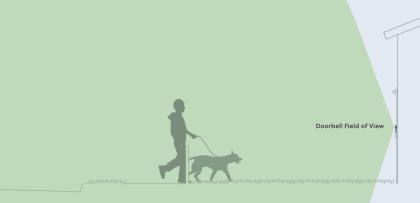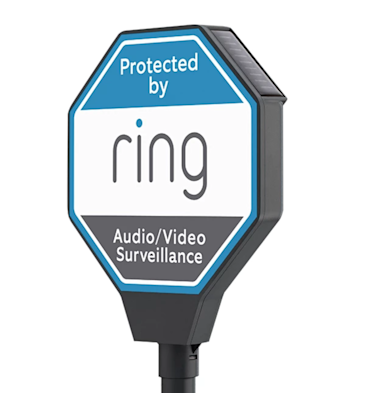Ring Installation Guide
Once you’ve bought your Ring device, how can you make sure you’re getting the most out of your extra layer of security?
Here are some practical tips for installing your device and getting set up with Ring.
1. Choose the perfect spot for your Ring device
Whether it’s a Ring Video Doorbell or Security Camera, find the right spot to ensure your Ring device is picking up motion and activity only on your property. The user guide for your device can help with how to set up according to the field of view you want.
We generally recommend you install your Video Doorbell at approximately 1.2 metres off the ground. This might feel low at first, but your device has a wide view of the world. With Ring Door View Cam, simply install the device in place of your existing, compatible peephole for a new point of view.

For additional security, install your outdoor Security Camera (such as Floodlight Cam Wired Pro, Floodlight Cam Wired Plus, Spotlight Cam or Stick Up Cam) to overlook your driveway, garden or any potentially vulnerable areas of your property. Be careful not to position your Ring Security Camera too low, so it can cover the area of your property you want to view and capture HD video of anyone in the camera’s field of view.
Note that with any device that captures video or audio, there may be local legal restrictions that apply to how you install and use your Ring device, so you may have to adjust the exact positioning or enable the privacy features explained below to comply with any applicable laws.
2. Customise your set-up
Now that you’ve installed your device on your property, ensure that you are aware of, and comply with any applicable local laws when using your Ring device – avoiding public spaces and neighbouring properties and utilising the features on your device to customise your video and audio settings.
Within the Ring app, you can adjust motion detection and select the areas within your device’s field of view where you want to monitor for motion via Camera Motion Zones. All Ring Video Doorbells and Security Cameras allow you to draw out a specific space (for example, your front garden or driveway) within your camera’s field of view to ignore motion occurring outside of that area. By defining motion zones that exclude private areas not on your property or public areas, such as pavements and roads, you can focus on events that take place only in the areas that are relevant for you. You can also disable Motion detection on your Ring device altogether, so that the Live View (or recording, with a Ring subscription plan) is only activated when the bell button on your Video Doorbell is pressed, or you access Live View in the Ring app.
You can also use Privacy Zones and the Audio Streaming and Recording toggle (available in the app for all Ring devices) to further customise your settings. Privacy Zones lets you define areas within your Ring device camera's field of view as "off-limits." Once a Privacy Zone has been created, that area is blocked from Live View and video recording. With the Audio toggle, you can turn audio streaming and recording on or off for your Ring Video Doorbell or camera. When you disable audio, you will not hear audio when you view a motion event, live view or an answered ring.
If you have a Ring subscription plan, you can set the storage period of your videos up to 180 days (with a default of 30 days). You can also delete videos at any time in the Ring app.
3. Welcome your Ring device to the neighbourhood
Make sure you let your neighbours, building owner, property manager, housing association, and other relevant parties know that you're adding an extra layer of security to your home before you install your new device. Depending on the rules of the country and the building you live in, you may be required to get consent from any impacted parties before setting up your device.
If you want to offer them extra peace of mind, consider adding them as a Shared User to your Ring device, so they too can see who’s there, no matter where they are. Find out more about adding a Shared User.
Please ensure you’re respecting your neighbours and complying with any applicable laws when you use your Ring device. You can use the features mentioned above (Motion Zones, Motion Sensitivity, Privacy Zones and the Audio Streaming and Recording toggle) that are available for your Ring device.
If your community isn’t keen to add a device to a shared door or entry, consider adding a Ring Stick Up Cam, Indoor Cam or Alarm system inside your home, to keep an eye on your front door from the inside.
4. Make it clear you’re protecting your home with Ring devices
Make sure your Ring device is visible, so guests to your property know they might be captured on video. In all Ring Video Doorbell and Security Camera boxes, you’ll find a free Ring sticker to put on your gate, door, wall or window. Once your Ring device is installed, fix the sticker or other signage at the appropriate entry points to your property to let guests know they might be recorded while on your property. This way, all visitors - wanted or unwanted - will know that your home is protected by a Ring device that can capture both video and audio.
Click here to download additional security stickers.
If you’re looking for a more prominent way to notify guests of your home security system, add a Ring Solar Security Sign to the outside of your house. Day or night, your solar-powered sign will let visitors know that you are protecting your home with a Ring device - and will help to warn any unwelcome intruders before they enter your property.

5. Review what's happened at home
Out of the box, set up your Ring device in the Ring app and immediately see, hear and speak to whoever’s in front of your device, from anywhere. To record the moments caught on camera, or to go back and review, download or share your Ring video, subscribe to Ring Home. Without a subscription plan, no video or audio is recorded or stored. If you have a Ring subscription plan, you can customise the circumstances when you want your device to record, set the storage period of your videos up to 180 days (default of 30 days), and delete videos at any time in the Ring app.
